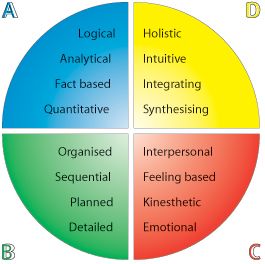
THINKING, what makes you tick?
What is your hard-wired thinking style, and why should you care? I was debriefing someone’s hard wired thinking style one day and all of a sudden she began to cry. I was taken aback, this hadn’t happened before. It was quite early into my career working with ‘The Whole Brain® Model (HBDI)’ but none the less I had profiled quite a few people to this point and my experience and training had not prepared me for such a reaction. Fortunately my other career had.
Of course I stopped the debrief immediately and put the information to one side. I found some tissues and poured a glass of water. The Lady apologised (none needed) and went on to explain that the information put in to words and explained perfectly how she felt about how difficult her life had become since the operation. A couple of years prior she required surgery to remove a tumor from her left cerebral cortex and with the tumor the surgeons were forced to also remove a significant part of her left cerebral cortex. She explained that waking from the operation she noticed that she was thinking and feeling quite differently.
Her hard-wired style of thinking had changed dramatically. She could remember her previous style from decades of experience. She had lived and made sense of her world, solved problems, learned and formed relationships with one style of thinking, and then quite literally woken up from an operation thinking in another style all together. A style that she did not recognise as her own. Of course many people around her noticed a change also. A change in what she said changes in what she did and how she behaved. I explained we could come back to the debrief later if she preferred. She urged me to go on. It was the first time she had been able to talk to someone who understood the changes and the context and could rationalize a meaningful explanation around the cause. Someone that she could talk with that did not partially at least, think she had ‘lost her marbles’. She told story after story about the things she used to like and do, and how she woke up liking new things that she, or anyone else for that matter, simply did not associate with her. We chatted, laughed and cried for the next two and a half hours.
If there was even one ounce (there wasn’t) of doubt about the accuracy and validity of the HBDI it was now gone forever, as a result of this one debrief. It remains as one of the most astonishing and touching experiences of my career so far. In the twelve years since I have profiled and debriefed hundreds of teams and individuals across many companies and industries with this invaluable information.

The information feeds back how our brains have over time become hard wired to prefer or like certain generic thinking styles. Alternatively a lack of hard wiring in certain regions leads to a dislike or avoidance of other styles. Some may like to analyse numbers, others may like to understand how others feel intuitively. Some may like a high level summary, others like finite details arranged in precise order. Neither is making a situational choice. Both are making sense of the situation according to a style of thinking that has arisen naturally over time. Of course this information is valuable and powerful as an affirmation for us as individuals (what makes me tick). The information becomes incredibly powerful and invaluable when we understand it as it applies to others. People that we live and work with (what makes others tick).
There is not a situation or context where this information is not of use: Leaders understanding and taking responsibility for their own impact on others. Leaders understanding their teams as individuals and a cohesive unit. Teams communicating and working more effectively with each other. Selecting and forming the most effective project team. Helping groups to understand and value diversity. Understanding and helping difficult people. Helping people to understand the process of influence and closing deals. This is just an introduction to the benefits of HBDI.
 Paul has been a HBDI Certified Practitioner for twelve years and has profiled and debriefed hundreds of teams, entrepreneurs, business owners, directors, managers and staff in businesses across many industries.
Paul has been a HBDI Certified Practitioner for twelve years and has profiled and debriefed hundreds of teams, entrepreneurs, business owners, directors, managers and staff in businesses across many industries.
Contact Paul to learn more about HBDI and how it may help you and your business.
mailto:[email protected] phone: +610428 881 024

